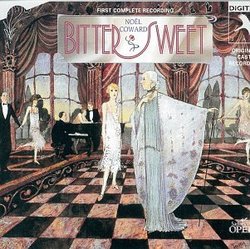| All Artists: Noel Coward, Michael Reed, New Sadler's Wells Opera Chorus and Orchestra, Rosemary Ashe, Michael Chance, Carol Lesley-Green, Valerie Masterson, Donald Maxwell, Ian Platt, Martin Smith, Michael Fitchew, Rachel Izen, Robert Johnson, Don Jones Title: Bitter Sweet (World Premiere Complete Recording) Members Wishing: 1 Total Copies: 0 Label: Jay Records Release Date: 3/9/1999 Album Type: Cast Recording Genres: Pop, Soundtracks, Classical, Broadway & Vocalists Styles: Vocal Pop, Opera & Classical Vocal, Musicals Number of Discs: 1 SwapaCD Credits: 1 UPC: 605288126420 |
Search - Noel Coward, Michael Reed, New Sadler's Wells Opera Chorus and Orchestra :: Bitter Sweet (World Premiere Complete Recording)
 | Noel Coward, Michael Reed, New Sadler's Wells Opera Chorus and Orchestra Bitter Sweet (World Premiere Complete Recording) Genres: Pop, Soundtracks, Classical, Broadway & Vocalists
|
Larger Image |
CD Details |
CD ReviewsA WONDERFUL RECORDING OF THIS CLASSIC OPERETTA. Boz | 08/03/1999 (5 out of 5 stars) "Noel Coward's evocative score with it's nostalgic tribute to Viennese operetta is beautifully recorded here. A rare gem." GLORIOUS "COMPLETE" RECORDING OF A TRUE CLASSIC . . . . J. T Waldmann | Carmel, IN, home to the fabulous new Regional Perf | 07/21/2006 (5 out of 5 stars) "NBC Radio. February 23, 1953. Marvin Miller, announcer: "Ladies and gentlemen, The Railroad Hour. (train whistles) And here comes the star-studded show train. (Theme music: orchestra & chorus) Tonight the American Association of Railroads presents Noel Coward`s operetta, BITTER SWEET, starring Gordon MacRae and his guest, Dorothy Warenskjold. Our choir is under the direction of Norman Luboff and the music is arranged and conducted by Carmen Dragon. Yes, tonight another big musical hit is brought to you transcribed by the American Railroads, the same railroads that bring you most of the food you eat, the clothes you wear, the fuel you burn, and all the other things you use in your daily life. And now, here is our star, Gordon MacRae!" BTV (before TV), my sisters and I would gather around the radio practically every Monday night for The Railroad Hour. It was never an "hour" show, debuting on ABC radio on October 4, 1948 with guests Dinah Shore and Jane Powell. The show was GOOD NEWS, condensed to 45 minutes. On May 2, 1949 the program switched to a 30-minute format -- SHOWBOAT with guest Lucille Norman. On October 20 of the same year it moved to NBC Radio, where it stayed through its final show on June 21, 1954 -- THE NEW MOON, also with Ms. Norman. I don't know how many of the 299 episodes I heard (a lot), but BITTER SWEET - "Coward's shameless attempt to revive sentimental operetta" - remains a particular favorite of mine. Maybe it's because BITTER SWEET is, if anything, a nostalgic show. The heroine, Sarah Millick - now the Marchioness of Shayne - recounts her life story at a party. Forty-five years earlier, ". . .she fell so desperately in love with her handsome young singing master that she threw it all away in order to be with him. In Vienna, five poverty-stricken years later, her adored Carl is killed in a duel. But his music lives on as the self-reliant Sarah earns fame throughout Europe with her singing. Finally returning to England, she marries the elderly Marquis of Shayne who has waited so patiently for her." -- The Guide to Musical Theatre Sure, the plot is corny, but the music is magnificent. "I'll See You Again," the theme song of the operetta, is probably Noel Coward's best known song, and a true classic. There's also the rousing "Tokay," magnificently sung by Donald Maxwell; "Dear Little Café," the Act Two duet for Sarah & Carl; the quartet "Ladies of the Town;" and "We All Wear a Green Carnation," sung by four overdressed, 1890s dandies; "Zigeuner," Sarah's big song in the final act; and my personal favorite, "If Love Were All," which includes the poignant phrase "I believe that since my life began/The most I've had is just a talent to amuse." Noel Coward's BITTER SWEET does more than merely amuse. Its soaring melodies and sophisticated lyrics actually have the power to lift the listener to a higher, better place. The production by the New Sadler's Wells Opera is absolutely first rate, with outstanding vocal work by Valerie Masterson as Sarah, Rosemary Ashe as Manon, & the previously mentioned Donald Maxwell. I tried to like Martin Smith (Carl Linden) but would have preferred a bigger, more operatic voice - Frank Porretta would have been ideal. But it's a minor quibble. The large supporting cast of singers is also outstanding. Very highly recommended. It's so good to hear melodies like these sung so gloriously. How unfortunate that its no longer feasible to mount shows like this (or THE GREAT WALTZ or KISMET, etc.) anymore. " Bittersweet perfection Regina Hilburn | Columbus, Ohio United States | 10/13/2003 (5 out of 5 stars) "I originally acquired this recording on vinyl in the summer of '89 during my first trip to London, & was stunned at the haunting richness of the score & the beauty of the perfomances, particularly Valerie Masterton's as Sarah. It remains one of my very favorite albums--I am listening to it again as I write this. Run, don't walk, to buy this, & discover one of the truly great gems of 20th century operetta that deserves to be staged more often."
|

 Track Listings (12) - Disc #1
Track Listings (12) - Disc #1